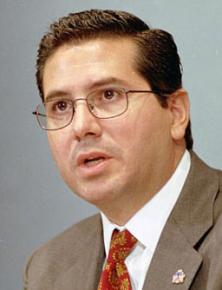Taking away the TM in D.C.
explains what was accomplished with the ruling by a government agency on the Washington football team's name--and what's still left to be done.
ON WEDNESDAY morning, I was exhausted, but still, with my crusty eyes, I reached for my phone to see what the news was, and those eyes opened wide when I read that the Washington football team's trademarks got cancelled. A federal agency ruled that the team's name is "disparaging to Native American"--and therefore can't be protected under federal law, which does not protect offensive language.
The U.S. Patent and Trademark Office's final opinion stated, "We decide, based on the evidence properly before us, that these registrations must be cancelled because they were disparaging to Native Americans at the respective times they were registered."
What does this mean? Until yesterday, the Washington football team's name was protected under the law, giving its owners exclusive rights to the name and logo. Now the team doesn't have those exclusive rights, which could cost it millions of dollars. The NFL could also be in the hole based on the league's revenue-sharing program.
I don't think it can be overstated just how big this ruling is for the movement to change the team's racist name. Dan Snyder, the owner of the team, has been on the offense recently, with his "research" while "traveling through Indian Country," from which he concluded that the name is respectful. This court decision will stop Snyder in his tracks--and basically just make him look stupid, though he already does that all by himself. Obviously, this decision doesn't force the Washington team to change its name, but it's a strong incentive. If Snyder is nothing but a greedy capitalist, then we need to hit him where it hurts.

In 1999, the Trademark Trial and Appeal Board made a similar decision, but that ruling was overturned by a federal court, citing a technical error. The plaintiffs say the error has been corrected in the current case.
So is today different? Will the ruling against the racist name stand?
NATIVE AMERICANS have been fighting to change racist sports team names for decades, mostly successful in high schools and colleges. But they have yet to hit a professional team hard. In the past couple years, though, the movement against the Washington football team name has gained momentum, with Native American Nations leading the way.
The Oneida Nation from New York started the campaign to change the mascot with the help of the National Congress of American Indians, which published a study showing how mascots are harmful to Native youth. Just last week, the Yocha Dehe Wintun Nation in California paid for an ad during halftime of game three of the NBA finals titled "Proud to Be."
Members of Congress have called on Snyder to listen to the calls of Native Americans, as has the Washington, D.C., Council followed suit. Mayor Vincent Gray has even suggested that if Snyder wants to move the team back into the city from the Maryland suburbs, he would have to reconsider the name. All of this despite Snyder's constant boasting that he'll never change the name as long as he owns the team.
The team's attorney Bob Raskopf said in a statement: "We've seen this story before. And just like last time, today's ruling will have no effect at all on the team's ownership of and right to use the Redskins name and logo...We are confident we will prevail once again, and that the Trial and Appeal Board's divided ruling will be overturned on appeal. This case is no different than an earlier case."
But the case is very different today. Dan Snyder and the Washington team are becoming more and more isolated in defending their racist name--sooner or later, they'll be the only ones left on an island, screaming to themselves.
This struggle will only be successful if it continues to be connected with the fight for Native American rights more generally. So let's be happy for this decision today--and continue to fight for a world that doesn't have racist mascots and respects the rights and sovereignty of Indigenous people.


